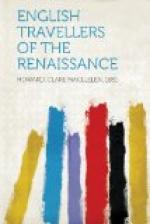This growing conviction of England’s superiority helped to bring about the decadence of travel for education. Travel continued, and the eighteenth century was as noticeable as any other for the “mal du pays” which attacked young men, but travel became the tour of curiosity and diversion with which we are familiar, and not an earnest endeavour to become “a compleat person.” Many changes helped this decadence. The “policy” of Italy and France, which once attracted the embryo statesmen of Elizabeth, was now well known and needed no further study. With the passing of the Stuarts, when the king’s favour ceased to be the means of making one’s fortune, a courtly education was no longer profitable. High offices under the Georges were as often as not filled by unpolished Englishmen extolled for their native flavour of bluntness and bluffness. Foreign graces were a superfluous ornament, more or less ridiculous. The majority of Englishmen were wont to prize, as Sam Johnson did, “their rustic grandeur and their surly grace,” and to join in his lament:
“Lost in thoughtless
ease and empty show,
Behold the warrior dwindled
to a beau;
Sense, freedom, piety refined
away,
Of France the mimick and of
Spain the prey."[383]
A large section of society was inimical to the kind of education that the Earl of Chesterfield prescribed for his son. The earl was well aware of it, indeed, and marked with repugnance divers young bucks of his day with leathern breeches and unpowdered hair, who would exclaim; “Damn these finical outlandish airs, give me a manly resolute manner. They make a rout with their graces, and talk like a parcel of dancing masters, and dress like a parcel of fops; one good Englishman will beat three of them."[384]
Even during the height of the Grand Tour in the latter half of the seventeenth century, thoughtful minds, observing the effects of a foreign education as seen not only in the courtiers of Charles II., but in the dozens of obscure country gentlemen who painfully sought to acquire the habit of a Parisian Marquis by education abroad, noticed the weak points of such a system. The Earl of Clarendon thought it pernicious to send boys abroad until after they had gone through Oxford or Cambridge. There was no necessity for their getting the French accent at an early age, “as if we had no mind to be suspected to be Englishmen.” That took them from their own country at just the age when they ought to have severe mental discipline, for the lack of which no amount of social training would make them competent men. “They return from travel with a wonderful confidence which may very well be called impudence ... all their learning is in wearing their clothes well; they have very much without their heads, very little within; and they are very much more solicitous that their periwigs fit handsomely, than to speak discreetly; they laugh at what they do not understand, which understanding so little,




